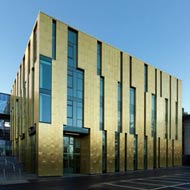
Human and veterinary virologists partner up
A new £23 million centre for virus research has opened at the University of Glasgow. The facility will support the UK's largest grouping of human and veterinary virologists.
The Centre for Virus Research (CVR) is located in the Sir Michael Stoker Building, which is home to state-of-the-art laboratories, offices and social spaces.
CVR's mission is to improve knowledge and understanding of viruses and viral diseases in both humans and animals. In total, it comprises more than 180 staff and students.
Researchers will work with colleagues at Glasgow University, Health Protection Scotland and NHS Greater Glasgow and Clyde.
Professor Massimo Palmarini, CVR's director, said: "Infectious diseases, many of which are viral in origin, continue to impose a major burden on healthcare resources and are responsible for the death of 15 million people each year.
"CVR scientists investigate human and animal viruses at all scales, from their genes and proteins to the paths they take through populations."
A striking landmark on the university's Garscube Campus, the building takes its name from one of the country's most pre-eminent post-war scientists. Sir Stoker was also the first chair of virology at the university and in the UK.
CVR was opened officially by Sir Mark Walport, the government's chief scientific advisor. The ceremony also saw five of the centre's staff receive the Ebola Medal for service in West Africa.
The recipients worked in the virus diagnostic laboratories in Sierra Leonne.
Backed by Her Majesty The Queen, the Ebola Medal recognises the hard work and courage of those who helped to tackle the ebola epidemic in West Africa. It is the first campaign medal to be awarded by the UK Government for a humanitarian crisis response.
Image courtesy of the University of Glasgow



 The latest
The latest